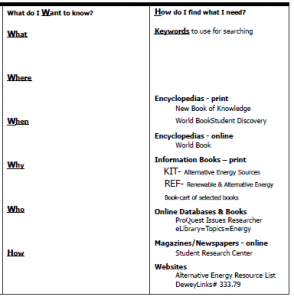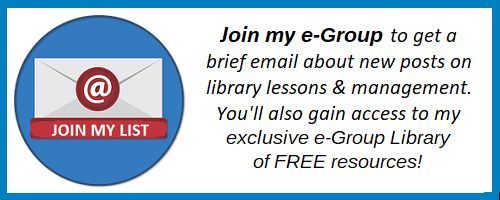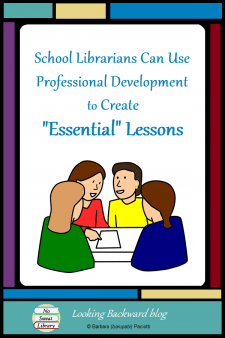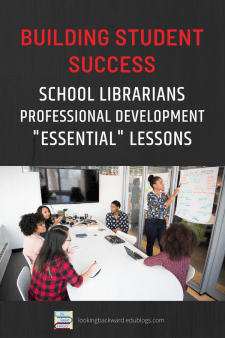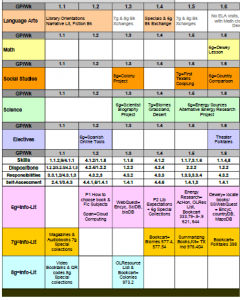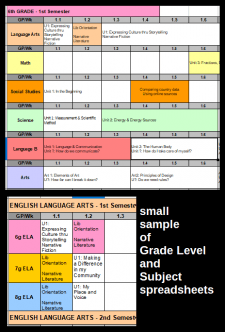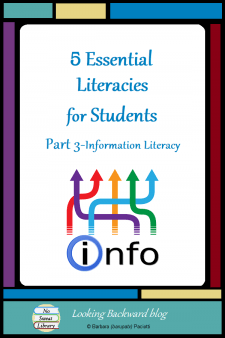 In our complex, information-rich, culturally diverse world, literacy is no longer just knowing how to read and write. Students need to understand and be proficient in these Five Essential Literacies to be successful in our global society:
In our complex, information-rich, culturally diverse world, literacy is no longer just knowing how to read and write. Students need to understand and be proficient in these Five Essential Literacies to be successful in our global society:
- Reading and Writing (the original literacy)
- Content/Disciplinary Literacy (content & thinking specific to a discipline)
- Information Literacy (the library curriculum)
- Digital Literacy (how and when to use various technologies)
- Media Literacy (published works—encompasses all other literacies)
As School Librarians we need to integrate at least one Library Literacy component into every class visit to the library, so I’m addressing each of these literacies in a separate blog post to offer examples/suggestions about how we might do that. Previous blog posts covered Reading Literacy and Content/Disciplinary Literacy, so this post looks at Information Literacy.
DEFINING INFORMATION LITERACY
In its new National School Library Standards for Learners, School Librarians, and School Libraries, the American Association of School Librarians (AASL) defines information literacy as “knowing when and why information is needed, where to find it, and how to evaluate, use, and communicate it in an ethical manner.” (p 277) We can embody this definition in our Library Lessons using these 3 Components for Information Literacy:
- Research Process Models help students plan a project, determine sources of information and select materials, synthesize information, create a unique product, and reflect on product and process.
- Search and Evaluation Skills help students find, access, and evaluate resources in a variety of formats.
- Academic Honesty & Note-taking give students an understanding of, and respect for, intellectual property, copyright, and fair use when extracting & using information, creating work products and presenting results.
HOW TO INTEGRATE INFORMATION LITERACY
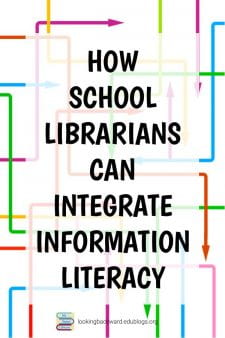 We School Librarians face several obstacles to teaching Information Literacy Components to our students:
We School Librarians face several obstacles to teaching Information Literacy Components to our students:
- The Information Literacy curriculum is often embedded into subject curricula, but not identified as taught by the School Librarian.
- Class library visits are arbitrary and haphazard, making consistency and continuity of lessons difficult.
- Teachers are ignorant about collaboration with a school librarian or have had negative experiences.
To overcome these obstacles, our Information Literacy lessons need to be short purposeful chunks that provide only what students need for the assignment. Such lessons encourage teachers to collaborate often so we can scaffold the necessary Info-Lit skills for each grade level through the school year. I’ve written previously about my Library Curriculum Matrix, an organization tool I use to plan & track my lessons, so let’s look at some specific strategies we can use for each Information Literacy component.
RESEARCH PROCESS MODELS
I’ve used many Research Process Models, and each has its benefits and flaws, but all can achieve our goal to develop a problem-solving mindset in students. Some models have more steps, some fewer, but all research process models have 4 basic phases: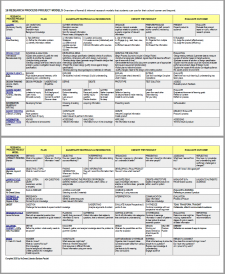
- plan
- aggregate materials & information
- create a product
- evaluate outcome.
Download my FREE chart of research process models to choose a model most suited to grade level, subject, and assignment. To make the process clear and understandable, give students an infographic of the model. I use just 2 simple models for 6th graders and scaffold the planning process throughout the school year. During 7th & 8th grades I present more models, so before they leave our campus, students have learned how to use a variety of research processes.
Teachers rarely include planning as part of a research assignment—students have a single topic, gather the same information, and regurgitate the same product. We can change that by showing teachers quick planning strategies to incorporate into a library visit. Simple brainstorming with Post-It® Notes, a Thinking Map Circle©, or a KWL chart stimulates students to think in terms of problem-solving and are quick & easy ways to begin a project.
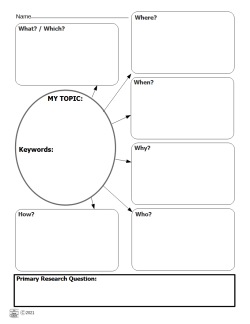 Use a graphic organizer to help students formulate questions for research. Questions also help students sift through resources for specific information, and because they require analysis and decision-making, they form that problem-solving mindset. Here are 4 graphic organizers I’ve used to generate questions:
Use a graphic organizer to help students formulate questions for research. Questions also help students sift through resources for specific information, and because they require analysis and decision-making, they form that problem-solving mindset. Here are 4 graphic organizers I’ve used to generate questions:
- my own 6-Question Topic Planner (at right)
- the W section of a KWL chart
- the Q-chart Question Builder
- the Britannica Pre-Research Planner
The plan phase of a Research Process Model is followed by the aggregate materials & information phase, and we move seamlessly into that Info-Lit component when presenting resources students can use for their assignment.
SEARCH & EVALUATION SKILLS
We need to teach students 3 different elements of this Info-Lit component: source selection, search strategies, and resource evaluation.
Source selection may be proscribed by the teacher, the grade level, or the assignment. Based on the type of resources students need, we may offer a book-cart of library materials, an online Resource List of Web-based sources, or expand a KWL chart by adding How (as shown at right) to make a KWHL chart listing a variety of resources.
Convince students they will “save time and find better information” by using subscription databases and e-books provided by the state and school district. I use this 2½-minute video from Yavapai College: “What Are Databases and Why You Need Them.” If you really want to convince students, mention that they don’t have to evaluate these sources since they’ve already been approved!
The most important lesson we can teach students about search strategies is how to generate keywords. For a quick lesson students can write keywords on a Post-It® Note (which can be used as an Exit Ticket!). When we use a graphic organizer—such as the KWHL above—have students highlight or underline important words in their questions. To help students master the basics, download my keyword search form and provide it at library computers to reinforce the importance of keywords.
Pre-HS students don’t need to know the term “Boolean operators”, as long as they know how to use them. I include the search modifiers AND-OR-NOT on infographics, in graphic organizers, and as part of my keyword search form.
We can quickly teach students to sift top-level domain extensions when searching the free Web by typing site:gov, site:edu, or site:org into the search field of a search engine.
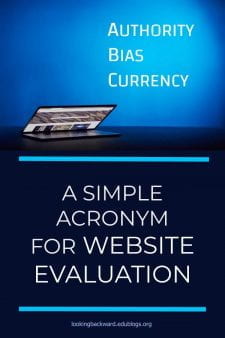 This is a perfect segue into resource evaluation, a topic with many Internet checklists and acronyms. To keep things quick, easy, and memorable, I use this simple 3-letter “ABC” acronym which I believe is enough for evaluating the quality of any resource:
This is a perfect segue into resource evaluation, a topic with many Internet checklists and acronyms. To keep things quick, easy, and memorable, I use this simple 3-letter “ABC” acronym which I believe is enough for evaluating the quality of any resource:
- Authority — Who is the source of the information?
- Bias — Why is this published, for what purpose?
- Currency — When was this information published or updated?
You may wonder why I don’t have all the criteria other evaluators use:
- I don’t include validity/usefulness, because it’s implied when students select sources that answer the planning questions for their topic. If a source doesn’t provide answers to any questions, they don’t need to evaluate it; if it does, then they use ABC.
- I don’t include reliability, because it’s part of Currency and Authority. If the site creator has the proper authority, then we can accept it as reliable.
- I don’t include accuracy, because that can’t take place until the “create” phase, when students analyze and compare information after it’s been aggregated from sources. If the information isn’t accurate, the source isn’t used.
Part of the aggregate materials & information phase of a research process model is extracting information from chosen sources, and that’s when we discuss Academic Honesty Guidelines & Note-taking Skills with students.
ACADEMIC HONESTY & NOTE-TAKING
It’s important to give students an understanding of, and respect for, intellectual property & fair use so they legally access and ethically use information & media, and properly cite copyrighted text, images, music, and video to avoid plagiarism or piracy when producing their end product. For years I struggled through these lessons, but as soon as I began to use the phrase “academic honesty,” students became more positive toward these lessons—I believe it empowers students to meet high standards and builds their self-esteem.
A previous blog post about how I teach Academic Honesty includes examples and resources, but here’s a quick overview of the 3 conceptual elements of Academic Honesty, organized in the order that best complements the problem-solving mindset we’re trying to implant in students:
 Intellectual property – creations of the mind that belong to the originator or other designated owner.
Intellectual property – creations of the mind that belong to the originator or other designated owner.
- Citation
- Bibliography
- Copyright – legal rights given to owners of creative work so it can’t be used or stolen by others.
- Note-taking by quoting/paraphrasing, in-document citation
- Note-taking by summarizing
- Fair Use – limited legal use of copyrighted material.
- Public domain – works whose intellectual property rights/copyrights are expired, given up, or excluded.
- Creative Commons
- Plagiarism – presenting someone else’s words, ideas, or creative expressions as one’s own. An ethical (not a legal) issue of academic dishonesty/fraud.
This conceptual separation of Academic Honesty can allow us to incorporate a short lesson on any concept throughout the school year.
WHAT’S NEXT?
Research process models, search and evaluation skills, and academic honesty complete the Library Information Literacy curriculum, but in our modern technological and global world students need more. Technology skills are crucial for future schooling and employment, and students also need to learn how to ethically interact with and evaluate all the media around us, so come back for Parts 4 & 5 of Essential Literacies as I offer ideas for incorporating digital literacy and media literacy into library visits.
This is the third entry in my series of blog posts on the 5 Essential Literacies for Students. I invite readers to offer comments and suggestions about any or all of these literacies.
Research Process Models
| You can find the Research Processes chart & keyword search form on my FREE Librarian Resources page. | |
 |
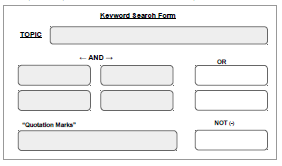 Keyword search form |
| The 6-Question Research Topic Planner mentioned above can be downloaded free by joining my e-Group mailing list. Click on the invitation below. | You can find the Notetaking Worksheet mentioned above at No Sweat Library, my TeachersPayTeachers store. |
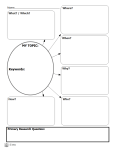 |
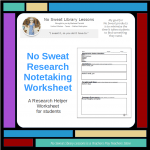 |
| You can find my 4 Academic Honesty lessons featured in NoSweat Library, my TeachersPayTeachers store. | |

